Leon’s Diary – August 1942 to February 1944
The Middle East – Training
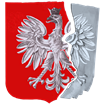
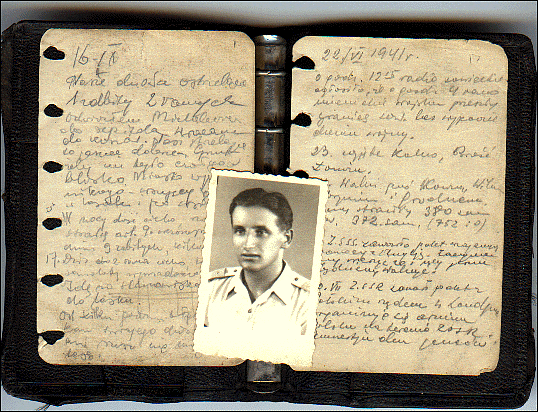
The Katyn Diary of Leon Gladun survived numerous encounters with death, both German and Russian. It chronicles battles in several campaigns and records the writer's travels through many countries on four continents. Though Leon died in 1973, the material in his diary is being used as evidence by the Commission for the Investigation of Crimes against the Polish Nation, in Warsaw. (Photo of Leon taken in Palestine).
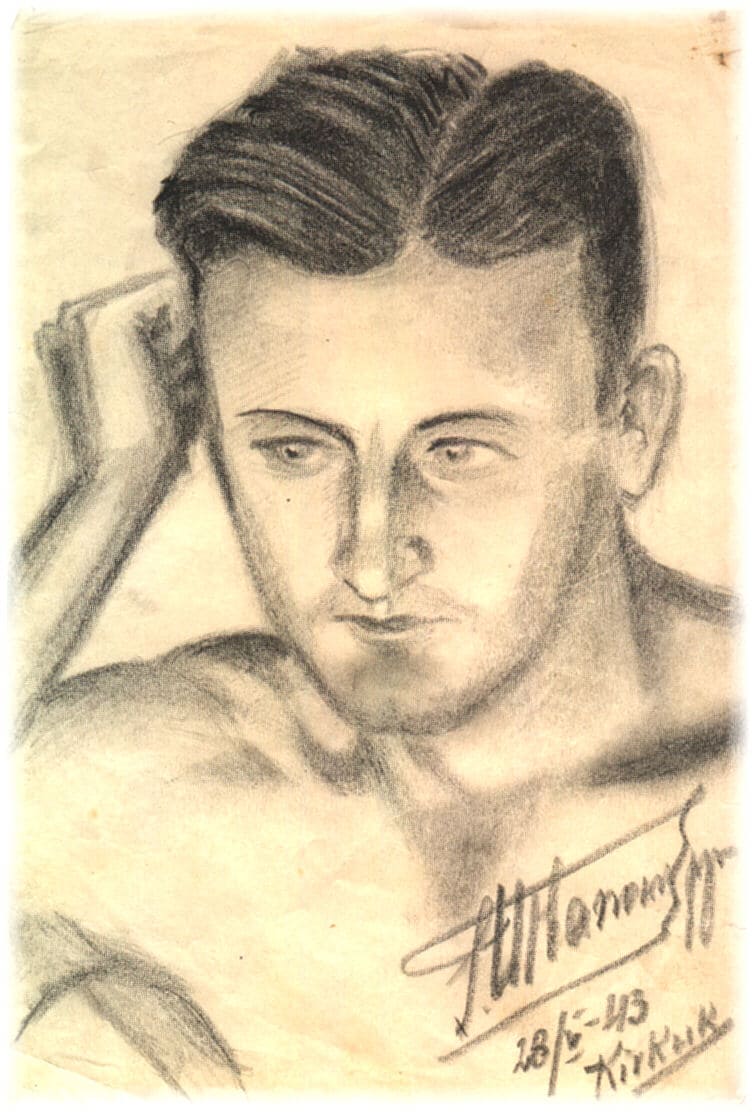
Leon Gladin sketch by friend later killed in action in Italy - 1943, Kirkuk, Iraq

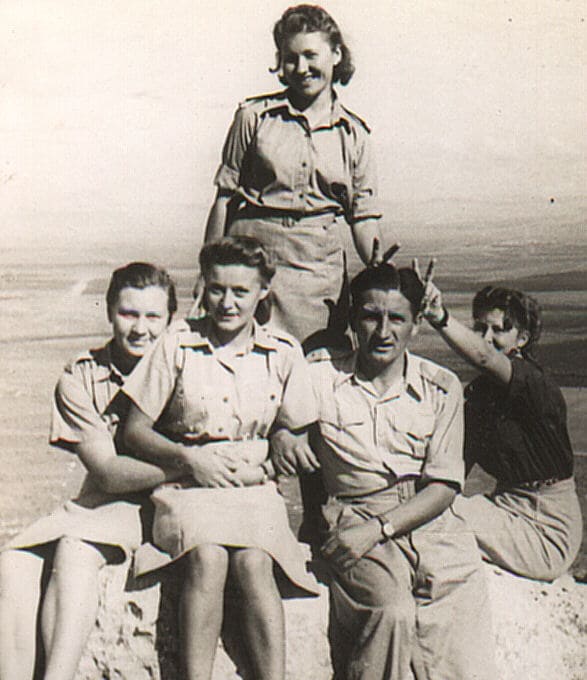
Jenin: September 4, 1943
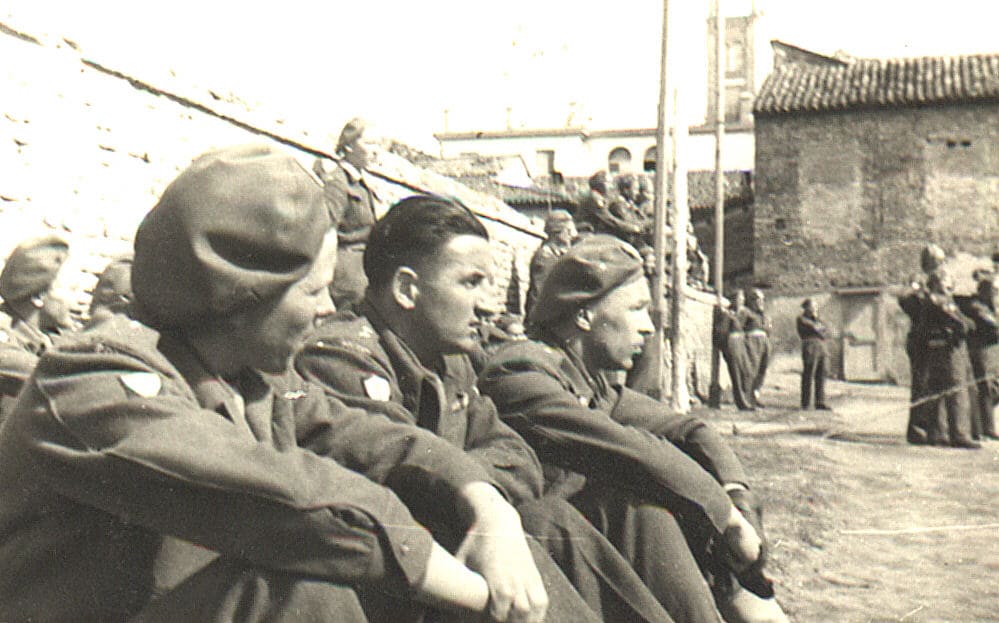
Leon and comrades relaxing during training
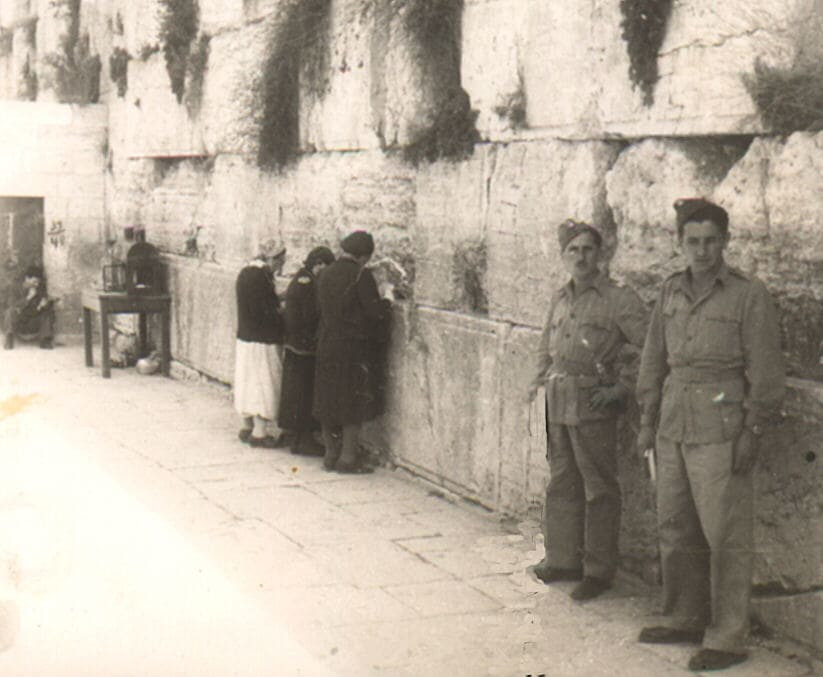
Western Wall, Jerusalem: Leon and comrade.
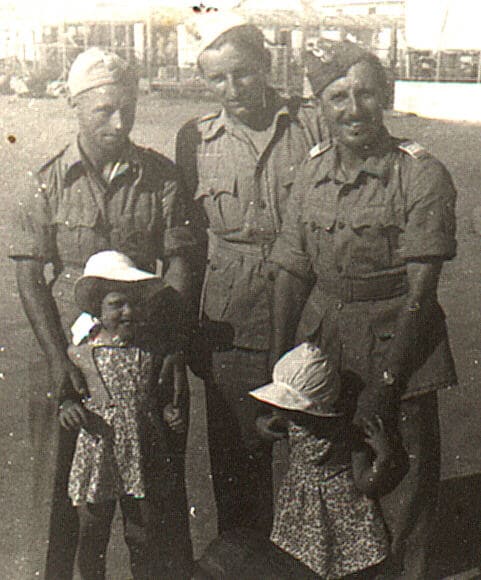
Polish Orphans evacuated from the USSR. A school for girls was set up in Jenin and later Nazareth; in 1947 these schools were tranferred to England. For boys aged thirteen to seventeen, a Military Cadet school was established in Palestine.
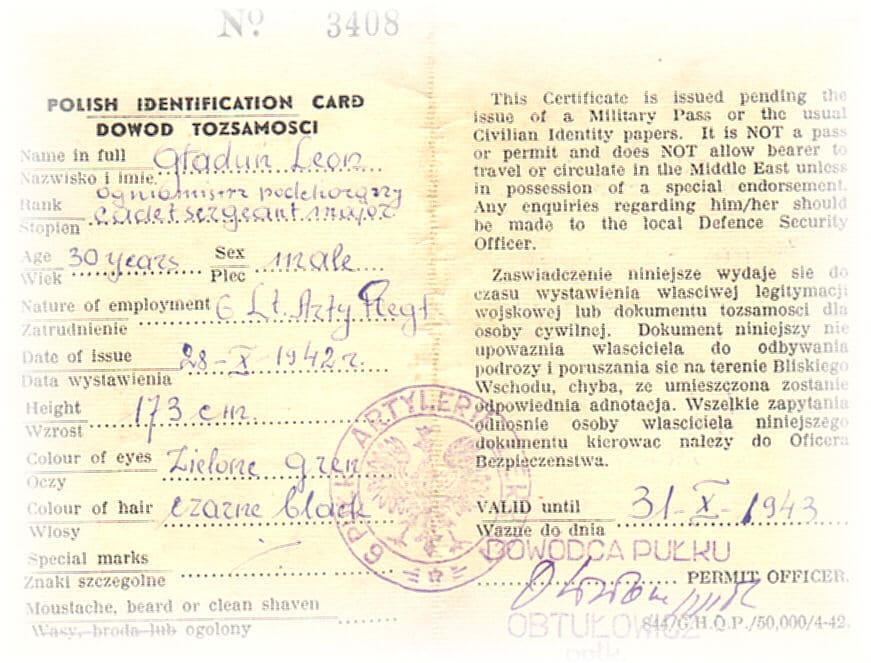
Persia
August 26 – We arrived at Pahlevi in Persia. Finally it’s finished: “paradise” is behind us. We weren’t long in Pahlevi–after two weeks of gorging ourselves and swimming in the Caspian we travelled by cars to Iraq. The road was beautiful and dangerous: huge mountains, serpentine passes, gorges–and the Persian drivers drove like Satan himself! After several days of travel we arrived at our new bases at Ksil-Ribat and Kana-Quin. We set up home in tents in the desert. In a while reorganization took place and on October 11, I returned once more to the 6 PAL [Light Artillery Regiment] 5 Bat.
Iraq – Close to Death
November 28 – I came down with malaria and went to Hospital No. 3 where I was also very seriously ill with meningitis and was in the hospital for 2 12 months. I tried for a vacation in Palestine but nothing came of it. [Doctors were amazed that Leon survived malaria and meningitis simultaneously–a blood clot formed at this time which would cause a fatal heart attack in 1973.]
1943
February 9 – Return from hospital.
March 16 – I travelled to Baghdad for ten days. The city proved disappointing for me as it had for many–it did not impress me as that city I’d read about in The Thousand and One Nights.
March 17 – Upon return from Baghdad I suffered a relapse of malaria and spent another 3-week treatment in Hospital No.3. During this time my regiment changed it base to Kirkuk. The same old desert but with a few more people and a refinery. While in Kirkuk I twice managed to visit the 5CCS Hospital and Hospital No.1.
June 30 – Promotion to Second Lieutenant.
July 22 – Hospital No.1 again
Palestine – Syria
August 1 – Finally I received my star.
August 9 – We set out for Palestine. Finally some kind of better time is beginning. We travelled for 8 days through the desert. Along the way we had stops for water, food and fuel. It must be admitted that the British know how to organize such things.
August 16 – We arrived in Gaza (Palestine). We didn’t have much luck in getting a good place. Our brigade is the furthest south and far from Tel-Aviv and the rest of the army–but buses and the auto-stop operate frequently so we’ll manage somehow.
August 19 – Jurek, Bogus, Romek and I set out for the unknown: a pass for Tel-Aviv! After 7 cars we arrived by auto-stop in Rechovod and took lodging in a hotel. That evening we went dancing with some of our own Pestki [Polish female soldiers]. Next day we visited Tel-Aviv, a beautiful and modern city that impressed me a great deal. It’s full of bright brick buildings, much greenery, and many beautiful and classy women–in a word Europe! It’s amazing that you can correspond in the Polish language almost everywhere. In stores and restaurants you can hear it among the Jews. German is also popular, and of course English is the second language of business and government. Often on the streets you can meet young women in shorts, and what’s quite pleasing to the eye is that it just happens that those that wear shorts are quite shapely, and not with crooked legs! As well there’s many soldiers of different nationalities in the streets: Poles, English, Americans, Greeks. The uniforms are almost the same–only the insignias are different. The bars are full of Yanks and Brits drinking and singing their songs accompanied by banging on pianos. You can have a great time if you have the money. “Business is All!” is the ruling theme of Tel-Aviv. One great attraction is swimming in the sea and we enjoy this whenever possible. It’s too bad that I’m going to have to go for a course in Syria and give up the sea. Apparently there’s no snow there in the mountains at this time of year and there won’t be any skis as well.
August 29 – Following Mass, Jurek and I set off for Rechovod. Before Rechovod we dropped in at Hospital No. 3. which had just arrived without much staff who’d all gone off on passes. After grabbing a bite to eat we skipped on over to Tel-Aviv. We visited Genati J where we enjoyed an orchestra and conversed a bit with Greek soldiers sitting next to us using some French and a bit of English. A pretty good time.
August 31 – The auto-stops indeed are convenient. In half a day you can make it to Rechovod, have a good time, and return that evening. Some English soldiers are behind us waiting. I’ve discovered that their countrymen are swine–they never stop for you at an auto-stop and just barrel by like madmen.
Polish Orphans
September 4 – We went on a little expedition to Jerusalem. From there in the afternoon we board an Arab bus for Nablus and then on to Jenin where there’s a school of young Polish refugees. I’ve discovered that a trip aboard an Arab bus is not a pleasure–it’s crowded, loud and smelly. Jewish buses are a whole better class. In Jenin there’s about 700 Polish girls enrolled in primary and high school who are busy learning and trying to make up for lost time and opportunities caused by the war. We meet Jasia, Marysia and others and take a lot of photos. Next morning we leave for home. Along the way
in Tel-Aviv I finally purchased a real Omega wristwatch.
September 6 – Return from Rechovod where I was in 3 hospitals all under camouflage. Irka was here and claims she’s gotten married–I don’t know if she’s lying, but she showed me her wedding ring. Upon return I learn we’re off to Syria tomorrow for an officer’s course. Bogdan is going as well.
September 7 – We left for the course by train at exactly 8 a.m. Rail travel is certainly a lot slower than by car. We sat for a few hours in Haifa and I managed a walk to the city. Haifa as a port is more interesting than Feb-Quzo. The Arab section is down along the shore, while the Jews live on the mountain. We crossed the Syrian border at night. I awoke next morning at the station in Beirut which overlooks a bay. From there we travelled the whole time along the seashore–the ocean on one side and mountains on the other. At 10 we arrived in Tripoli.
September 8 – Syria-Lebanon-Tripoli. We piled into cars and set out. The road was constantly uphill. Many olive trees. We’re assigned to 1 PAL. The English are leading the course only for 1 Brigade–who knows how it will go. Next day the second group arrived–Michal is among them so it’ll be quite merry.
September 12 – We set off for a trip into the mountains. We completed our first mountain climb: not a very big mountain but we were all sweating buckets when we got to the top. Coming down the mountain I jumped a little too quickly and cut myself. Syria is beautiful in terms of its mountains. The winding roads are truly spectacular and the climate is great. The Syrian people are completely different from the Palestinians. Finally there’s no “baksheesh” here and the people are cleaner and better dressed. It’s also interesting that they’re so honest–the army camps are full of local kids but nothing gets stolen. We even conducted an experiment: money was left in the open with kids running around and it turned out that nothing went missing. When we give our clothes to the laundry no receipt is needed–just “all right.” The populace is mostly Christian and there’s lots of Catholic churches. The beautiful villages, sometimes located high in the mountains, are like Swiss chalets with red roofs and built from stone. There are many gardens full of grapes, bananas, apples, and the fruit is quite cheap to buy. The money exchange is a bit rough. A Lebanese pound has 100 piasters; in comparison for a Palestinian pound you get 8.83 piasters. The French language is known fairly well and the French influence is everywhere […]. Lots of kids in our camps; right from reveille they’re everywhere. Our drivers can’t cope with them–whenever a car appears they mob the vehicle. I visited Beirut twice. The streetcars give the impression of a big city […]. Plenty of soldiers of many nationalities particularly French. Toward the end of the course I suffered a relapse and went to the English hospital. Later I did some sightseeing in Tripoli as well as spending 8 days in Lebanon and a day in Haifa.
November 2 – Return from Syria.
November 6 – A visit to Jenin. Official tour of a kibbutz: the acceptance of new members. Again lots of photos. We set up plans for the celebration of Barbarka [St Barbara’s Day] on December 4.
November 10 – Again I’m admitted to Hospital No. 4. Soon we’re supposed to be off for Egypt–and from there to Europe.
November 24 – El-Casa.
December 4 – Barbarka went off a little worse than usual but not for everyone. There were too many women which caused a little trouble. Under camouflage with Marysia–Indeed! Indeed!
December 27 – II and III Divisions left for Syria. I remained with I Division and am to leave for a Polish GPO’s course at Almaz near Cairo. I spent three days travelling–on the first day of Christmas I was with M.K; later with Irka, Jadzia and lastly with Marysia S. Here at the last moment I solved the affair of Irka’s wedding. And too bad she was […].
December 29 – We leave Palestine for Egypt.
1944 – Egypt
January 1 – I cross the border at 9:35. We spent New Years’ under an open sky with a bottle of liquor. I’ve celebrated New Years’ in different ways–and this was just another one.
January 2 – We finally crossed the Suez Canal at 15:19 and at the same time passed the border of Asia-Africa. It’s already the third continent I’ve visited and I presume it will be the last one–it’s high time to return to Europe.That evening we arrived at our base in Qassian and immediately set off for Almaz and the Polish GPO’s course.
January 3 – Almaz. The course here is certainly not bad and you can really learn something. They give us a lot to eat, almost too much. For the three weeks of the course I was in Cairo every free Saturday and Sunday. The connection is convenient as some 300 meters from the gate there’s a streetcar stop which leads to downtown. Cairo is a big city with plenty of traffic with many cars and streetcars. There’s almost no black-outs. Many clubs and cabarets–the booze is damn expensive but food is reasonable. I had the opportunity to watch some Eastern belly-dancing and other such spectacles. I toured the pyramids and the Sphinx as well as the most beautiful mosque in Cairo in the Citadel. I visited the zoo a couple of times, bought a few things and thus ended my stay in Cairo.
January 25 – I finished the course and returned to Quassian.
February 14 – We’re setting off closer to our goal. After a couple of days of preparation and division into proper groups, we began our journey for Italy: Europe at last! We travelled at night by motor to the station. After several hours we arrived in Port Said.
February 15 – Port Said. From the train we’re loaded directly to a ship. The Princess Katalen, an armed passenger ship of some 7,000 tons. I got a cabin on the highest deck. Only 2 to a cabin which is fairly comfortable except that there’s little light due to the black-out. This time the blackout is not bull and we really have to be careful
To Italy
February 16 – We set off from Port Said at 15:00 hours. We’re crossing the Mediterranean in a convoy consisting of 12 ships and 6 patrol vessels. So far everything is fine even a bit boring–the rolling is tolerable, everyone’s feeling all right and we generally have an appetite. But later the weather worsened and the rolling got a little stronger.
February 17 – Seasickness overcame everybody. They’re lying around or sitting with pale faces and blank stares–our appetites are done for. I somehow hung on pretty good but finally I gave up my food twice in the usual manner. Later I felt better. But others were constantly on their knees and ate little.
February 18 – The rolling is terrible–a real storm. We pass by Crete. So far there’s no enemy planes or submarines. Again we must turn our watches back an hour due to a time change. So many times have I changed my time and my money–and how many more times will there be?
February 19 – I woke early in the morning–the rolling of the ship had changed from lengthwise to crossways. In the galley everything is flying around in all directions: forks, plates, and the chairs slide in all directions. We’ve sailed some 650 miles in a northwesterly direction toward Italy. That morning there’s shooting at some plane–I was hoping for something interesting but nothing comes of it. The trip is starting to get boring. I pass the time by reading a bit, teaching myself Italian a bit, and of course writing a bit on these pages. Supposedly we’re to arrive tomorrow.
February 20 – We sail past Sicily. At last Europe. Tomorrow we’ll be there.
February 21 – We’re nearing port. We’ve sailed 1,600 nautical miles–you can say we’ve covered quite the road. It’s 19:45 hours; in some half an hour we’ll be docking. It’s no longer warm: you can feel the difference as it’s not too warm even in a jacket. After all it’s the end of February and at home in Poland it’s bone-chilling cold.
Christopher Jacek Gladun was born in 1951 and grew up in Canada to where his family emigrated from England as displaced persons. Sadly, Chris died in Toronto in March 2003. He held a diploma in Journalism from the Niagara College and a BA in Polish Language & Literature from the University of Toronto. Chris also acted as interviewer and researcher for the documentary film “Rescued From Death in Siberia”.
This content is now maintained by the Kresy-Siberia Group, which Chris was a charter member of and which is taking his website and his research work forward.